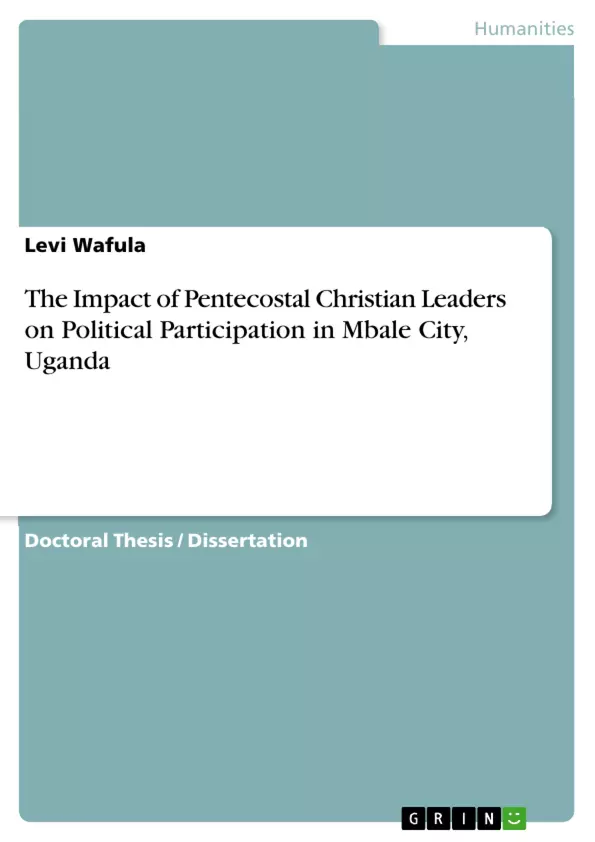This dissertation delves into the emerging prominence of Pentecostalism and its influence on political engagement in Mbale City, Uganda. It seeks to understand the theological and biblical underpinnings that guide the political perspectives of Pentecostal Christian leaders in the region. Additionally, it aims to assess how these leaders impact the political involvement of their congregants, explore the relationship between Pentecostalism and various political ideologies, identify the challenges faced by Pentecostal leaders when engaging in politics, and offer recommendations to enhance their role in promoting responsible political participation.
To address these objectives, a mixed-methods approach was employed. A survey of 75 residents of Mbale City provided quantitative data on political behaviors and perceptions related to Pentecostal leaders. Complementing this, in-depth interviews were conducted with 10 Pentecostal bishops and overseers to gain deeper insights into their beliefs and practices. The data collected from both sources were analyzed to draw meaningful conclusions.
The study's findings underscore the substantial link between Pentecostal Christian leaders and political participation in Mbale City. It reveals how these leaders effectively mobilize their congregants, instill a sense of civic responsibility, and influence their political attitudes. Furthermore, the research uncovers potential challenges and opportunities arising from the intersection of religion and politics in the city.
In conclusion, this research sheds light on the intricate relationship between religion and politics, particularly within the context of Pentecostalism in Uganda. It affirms the significant influence of Pentecostal Christian leaders on political engagement in Mbale City, advocating for informed and inclusive approaches to democratic governance and community development. Nevertheless, it is important to acknowledge the study's limitations and recommend further research and strategies to foster responsible political behavior in a religiously diverse society.
Inhaltsverzeichnis (Table of Contents)
- Chapter 1: Introduction
- Background to the Study
- Statement of the Problem
- Purpose of the Study
- Research Questions
- Objectives of the Study
- Significance of the Study
- Scope of the Study
- Limitations of the Study
- Definition of Terms
- Chapter 2: Literature Review
- The Pentecostal Movement and Its Impact on Politics
- Political Participation in Uganda
- Religious Leaders and Political Influence
- The Case of Mbale City, Uganda
- Chapter 3: Research Methodology
- Research Design
- Population and Sampling
- Data Collection Methods
- Data Analysis Techniques
- Ethical Considerations
- Chapter 4: Findings and Discussion
- The Role of Pentecostal Christian Leaders in Mbale City
- The Impact of Pentecostal Christian Leaders on Political Participation
- Factors Influencing Political Participation
- Challenges and Opportunities
- Chapter 5: Conclusion and Recommendations
- Summary of Findings
- Conclusion
- Recommendations
Zielsetzung und Themenschwerpunkte (Objectives and Key Themes)
This doctoral research report explores the impact of Pentecostal Christian leaders on political participation in Mbale City, Uganda. The study aims to identify the ways in which these leaders influence the political choices and actions of individuals and communities in Mbale City. Through an in-depth analysis, the research seeks to understand the complexities of the relationship between faith and politics in this specific context.
- The role of Pentecostal Christian leaders in shaping political discourse and participation within Mbale City.
- The ways in which Pentecostal Christian leaders influence the political choices and actions of individuals and communities.
- The interplay between religious beliefs, political ideologies, and socio-economic factors in shaping political participation in Mbale City.
- The challenges and opportunities associated with the growing influence of Pentecostal Christianity on politics in Uganda.
- The potential implications of the findings for understanding the broader dynamics of religion and politics in Africa.
Zusammenfassung der Kapitel (Chapter Summaries)
Chapter 1 provides a comprehensive introduction to the research topic, outlining the background of the study, the problem statement, the purpose, research questions, objectives, significance, scope, limitations, and definition of key terms. Chapter 2 delves into the relevant literature, examining the Pentecostal movement's impact on politics, political participation in Uganda, the influence of religious leaders, and the specific case of Mbale City. Chapter 3 presents the research methodology, detailing the design, population and sampling techniques, data collection methods, analysis techniques, and ethical considerations. Chapter 4 presents the findings and discussion, analyzing the role of Pentecostal Christian leaders, their impact on political participation, the influencing factors, challenges, and opportunities.
Schlüsselwörter (Keywords)
This research report focuses on the intersection of Pentecostal Christianity and politics in Mbale City, Uganda. Key themes include Pentecostal Christian leaders, political participation, faith-based influence, religious activism, socio-economic factors, and the impact of Pentecostalism on the political landscape of Uganda.
Frequently Asked Questions
How do Pentecostal leaders influence politics in Mbale City?
They influence politics by mobilizing congregants, shaping political discourse through sermons, and instilling a sense of civic responsibility based on biblical interpretations.
What is the relationship between Pentecostalism and democracy in Uganda?
The relationship is complex; while leaders promote participation, there are challenges regarding the intersection of religious authority and independent democratic choices.
What challenges do Pentecostal leaders face in political engagement?
Challenges include maintaining neutrality, potential conflicts between spiritual and secular roles, and the risk of dividing their congregation based on political affiliations.
What was the methodology used in this study?
The research used a mixed-methods approach, including a survey of 75 residents and in-depth interviews with 10 Pentecostal bishops and overseers.
Does religious belief affect voting behavior in Uganda?
Yes, the study indicates a substantial link, as congregants often look to their spiritual leaders for guidance on moral and ethical standards which translate into political preferences.
- Quote paper
- Levi Wafula (Author), 2023, The Impact of Pentecostal Christian Leaders on Political Participation in Mbale City, Uganda, Munich, GRIN Verlag, https://www.grin.com/document/1403594



